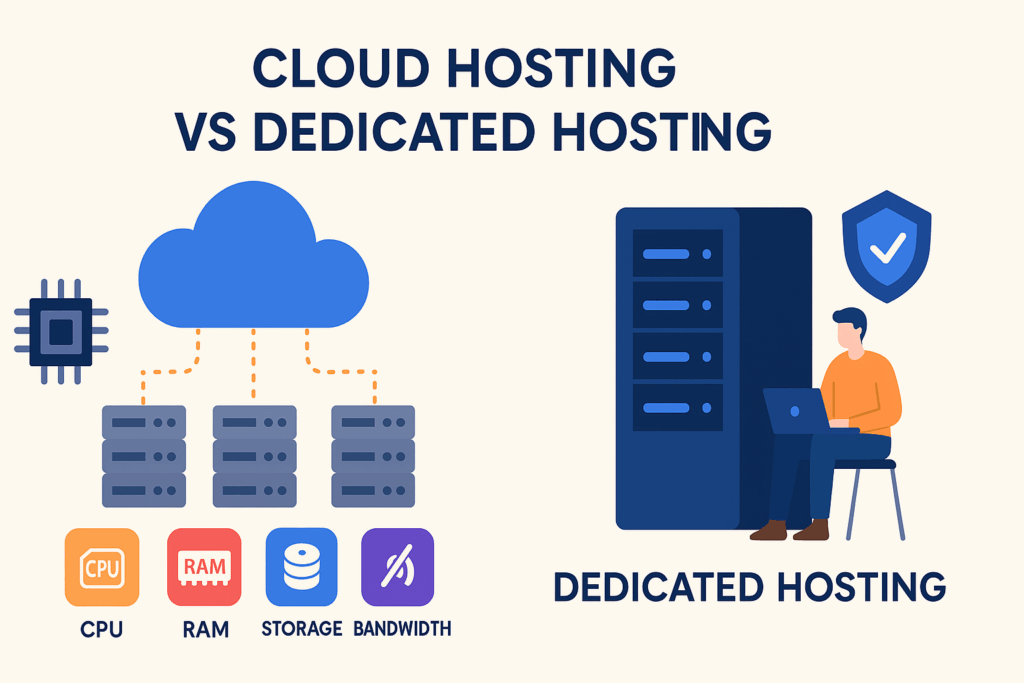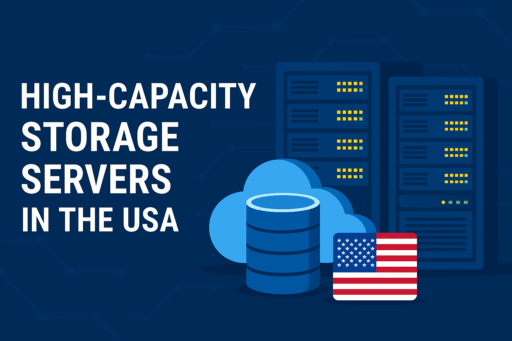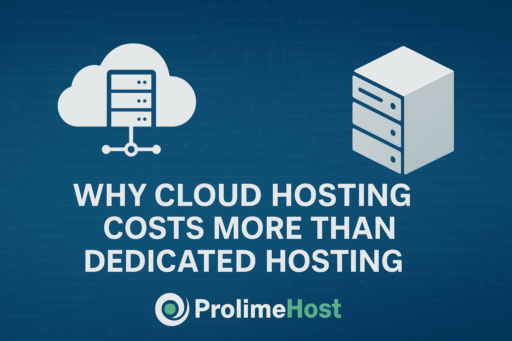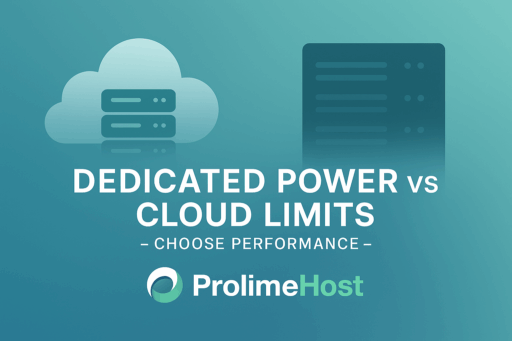
As businesses continue to scale and adapt to a digital-first world, choosing the right hosting infrastructure becomes a pivotal decision. The choice between cloud hosting and dedicated hosting affects everything—from performance and scalability to cost and control.
In this guide, we’ll break down the distinctions between the two, helping you determine which solution aligns best with your goals.
Infrastructure and Resource Allocation
Cloud hosting operates on a virtualized network of interconnected servers, allowing your website or application to draw from a shared pool of computing resources such as CPU, RAM, storage, and bandwidth. This distributed model delivers flexibility and redundancy, meaning that if one server experiences issues, another automatically takes over. It’s perfect for scenarios like Black Friday promotions or viral marketing campaigns, where demand spikes suddenly.
In contrast, dedicated hosting gives you exclusive access to a single physical server. All hardware resources belong solely to your business, ensuring predictable performance and eliminating “noisy neighbor” issues often seen in shared or public cloud environments.
Performance and Reliability
Cloud infrastructure is designed for high uptime and redundancy. If one node fails, workloads seamlessly shift to another within the network. However, because resources are distributed among multiple clients, performance can fluctuate depending on the provider’s resource management and traffic load.
Dedicated servers, on the other hand, deliver consistent and high-performance results. With no resource sharing, you gain full and reliable access to processing power—ideal for resource-intensive applications such as large eCommerce platforms, enterprise-level software, or high-traffic websites.
Scalability and Flexibility
One of the cloud’s greatest advantages is elastic scalability. You can easily scale resources up or down to accommodate traffic surges or business growth without downtime or hardware intervention. This makes cloud hosting the go-to choice for businesses with seasonal or unpredictable traffic patterns.
In a dedicated environment, scaling typically involves physical hardware upgrades or migration to a more powerful server. While this requires more planning, it ensures long-term stability and often aligns more closely with performance and budget expectations for organizations running mission-critical workloads.
Cost Structure
Cloud hosting typically operates on a pay-as-you-go model, meaning you pay only for the resources you consume. This is especially appealing for startups or short-term projects with fluctuating workloads. However, costs can escalate quickly during sustained high usage periods.
Dedicated hosting, in contrast, follows a fixed monthly or annual pricing model, providing predictable expenses. While the initial investment may be higher, it offers better long-term value for businesses that require guaranteed performance, security, and control over their environment.
Security and Control
Cloud providers often include robust security measures—firewalls, backups, DDoS protection, and compliance certifications. Still, because it’s a multi-tenant environment, you have limited control over physical security and certain configuration options.
Dedicated servers give you complete administrative control over your infrastructure. You decide the operating system, security configurations, and applications. This makes dedicated hosting particularly well-suited for regulated industries such as finance, healthcare, and government, where data compliance and isolation are critical.
My Thoughts: Choosing What Fits Best
The decision between cloud and dedicated hosting depends on your organization’s priorities:
-
If scalability, flexibility, and cost-efficiency are at the top of your list, cloud hosting is likely the best fit.
-
If performance consistency, control, and security matter most, dedicated hosting is the stronger choice.
Ultimately, aligning your infrastructure with your business goals ensures you’re ready to grow and adapt as your digital needs evolve.
FAQs
Q1: Can I combine cloud and dedicated hosting?
Yes. Many organizations adopt a hybrid approach, using dedicated servers for core workloads and cloud environments for scalable, on-demand tasks.
Q2: Which option is better for eCommerce websites?
Dedicated hosting generally offers more stability and speed, which are crucial for handling large transaction volumes and maintaining customer trust.
Q3: Is cloud hosting less secure than dedicated hosting?
Not necessarily. Top-tier cloud providers offer strong security, but dedicated hosting provides greater control and customization over protection measures.
Q4: How do I know if I’ve outgrown my cloud setup?
If your workloads demand consistent performance, custom configurations, or data compliance, transitioning to a dedicated server is often the next logical step.
Contact ProlimeHost
At ProlimeHost, we specialize in both dedicated and cloud-based hosting solutions, helping businesses choose the infrastructure that fits their performance, security, and growth goals.
📩 Email: sales@prolimehost.com
📞 Phone: +1 (877) 477-9454
🌐 Website: www.prolimehost.com
Future-proof your business with ProlimeHost—where performance meets reliability.




